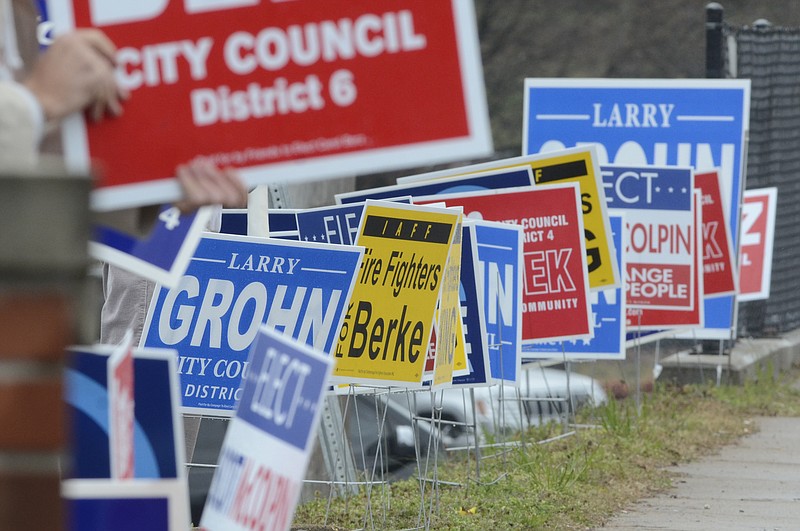
The mayor of Chattanooga and nine city council members will make more decisions affecting local residents than Donald Trump, Lamar Alexander, Bob Corker or Chuck Fleischmann. So why does it appear so few care?
Early voting for the March 7 nonpartisan municipal election lasts three more days (through Thursday), but totals through last week indicate voters will have to step it up in order to exceed early voting numbers in 2013.
Through the first 10 days of early voting this year, a daily average of just over 486 people cast their ballots at the Hamilton County Election Commission, Brainerd Recreation Center or Northgate Civic Center. In 2013, a daily average of 522 people voted early.
Is it election fatigue?
Voters have just endured an 18-month campaign for president that produced one of the most shocking results - whether you like President Trump or not - in the nation's history. And supporters of the president might well say the campaign has continued - to delegitimize the president, to delay his Cabinet nominees and to attempt to whip up hate against him.
Is it stress?
A survey from the American Psychological Association (APA) taken just before Trump was inaugurated said 57 percent of respondents thought the political climate itself was a source of stress. Majorities in both parties - 59 percent of Republicans and 76 percent of Democrats - said thinking about the future was a source of stress.
"The stress we're seeing around political issues is deeply concerning because it's hard for Americans to get away from it," said the association's Katherine Nordal.
Chattanooga municipal elections, sadly, don't draw many voters in the first place. In 2013, 16.39 percent of registered voters cast a ballot. In 2009, it was 18.09 percent, in 2005, it was 26.95 percent. And in 2001, it was 31.80 percent.
The trend is going in the wrong direction.
In other words, if the percentage of voters between 2013 and 2017 drops as much as it did between 2009 and 2013, fewer than half the percentage that voted in 2001 will vote in 2017.
That's tragic.
So what, if anything, is different about the ballot in 2017 from 2013?

The mayor's race, most observers would have to admit, is far more competitive this year. In 2013, Democratic state Sen. Andy Berke, who chose not to run for re-election, faced an unknown wastewater treatment plant employee. In 2017, the former state senator, now mayor, faces Chattanooga Councilman Larry Grohn, former Councilman David Crockett, and businessman Chris Long.
Berke, though extremely well-funded, has had to answer for some of the city's drawbacks and decisions he has made. He is likely to find considerable opposition in the Republican-rich Hixson and East Brainerd suburbs, but he only needs 50 percent of the vote - plus one vote - to win without a runoff.
In 2013, two City Council seats - those of Russell Gilbert in District 5 and Carol Berz in District 6 - were unopposed. This year, three seats are unopposed, those of Ken Smith (District 3), Darrin Ledford (who needs only his own vote to win in District 4, the seat Grohn is giving up to run for mayor) and Berz.
However, in 2013, only one of the races, that of Grohn in District 4, went to a runoff. This year, two of the three majority black districts could go to a runoff (Districts 8 and 9), as could what's always been known as a swing district (District 7), a district that when created had a roughly even split between white and black residents.
In Districts 1, 2 and 4, incumbent Councilmen Chip Henderson, Jerry Mitchell and Russell Gilbert, respectively, are likely to win their seats without a runoff.
In District 7, Councilman Chris Anderson has strong proponents and strong opponents. To get him into a runoff, former Councilman Manny Rico and businessman Erskine Oglesby Jr. will have to total 50 percent of the vote (plus one). In District 8, we don't believe a runoff will ensue. Voters either will want to keep longtime city employee Moses Freeman or will elect Criminal Court Clerk employee Anthony Byrd. The race's third candidate, Tom Kunesh, is unlikely to be a factor.
In District 9, three candidates active in their neighborhoods, Pat Benson Jr., Demetrus Coonrod and John Kerns, are vigorously challenging incumbent Yusuf Hakeem, who was re-elected to the seat in 2013 that he'd won five previous times before resigning to take a seat on the state Board of Probation and Parole. We believe Hakeem is likely to be defeated either in the municipal election or a runoff, but whichever of his opponents turns out the most voters may win the seat.
Although the municipal election is one week from today and two days remain in early voting, voters still have time to brush up on the candidates. They can check out candidate websites, Facebook sites or visit timesfreepress.com/votelocal for profiles on all the candidates, news stories and opinion articles about the various races.
In November, 73.1 percent of Hamilton County's registered voters went to the polls. If half that percentage voted in the municipal election, it would be the most this century. It can be done. Let your voice be heard.
